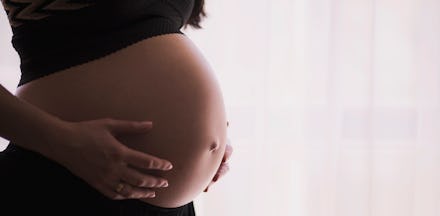5 Myths About What Pregnant Women Can and Can't Eat, Debunked

There's lots of info out there about what pregnant people should and shouldn't be eating — whether it's fish or peanuts or coffee, you can be sure that, if you're pregnant, someone has a strong opinion about your diet. But what is real medical advice and what's just a persistent myth? We break down some of the most widely held, but untrue, myths about pregnancy and food.
Read: What Can't Women Do When They're Pregnant? 11 Pregnancy Myths, Finally Explained
Myth No. 1: You shouldn't eat fish when you're pregnant.
There are some restrictions on fish when you're pregnant, but not all of it is off limits. According to the Northwestern Memorial Hospital, "Many women think it's just too confusing to understand which fish are OK to eat, so they avoid all types of fish, to the detriment of their child."
Fully cooked, low-mercury fish are OK to eat when you're pregnant, and can even be beneficial to a baby's brain and eye development.
Myth No. 2: You should drink herbal tea while pregnant.
Even though some herbal teas are marketed for pregnancy, the Mayo Clinic advises against drinking herbal teas while pregnant: "There's little data on the effects of specific herbs on developing babies. As a result, avoid drinking herbal tea unless your health care provider says it's OK."
Myth No. 3: Avoid sweets while you're pregnant.
Some chocolate during pregnancy may actually lead to a happier baby. According to a 2004 study, people who regularly ate chocolate while they were pregnant "were more likely to say their babies smiled and laughed a lot," reported the BBC. Everything in moderation, however, since chocolate can also have fat, sugar and caffeine in it.
Myth No. 4: Eat for two.
While it's certainly normal to eat more when you're pregnant, you may not need to be eating double your normal intake. According to Northwestern Memorial Hospital, "A pregnant woman may be eating for two, but one of them only weighs a few pounds. Your body only [needs] about 300 extra calories when you are pregnant. That is about the amount in one cooked chicken breast, without the skin."
Myth No. 5: Eating peanuts while pregnant will make your baby allergic.
Back in 2000, amidst growing concern about peanut allergies in children, the American Academy of Pediatrics advised people to avoid them altogether while pregnant. But, according to Boston Children's Hospital, new research shows there's no need to abstain from peanuts. "Women need not fear that eating peanuts during pregnancy could cause their child to develop a peanut allergy," the hospital announced in 2013, releasing the results of a study conducted by Children's Hospital's Dr. Michael Young.
In fact, according to Young, eating peanuts while pregnant may actually help prevent allergies: "Our study showed increased peanut consumption by pregnant mothers who weren't nut allergic was associated with lower risk of peanut allergy in their offspring."
Correction: March 31, 2016